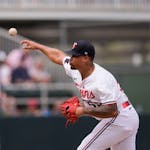Even though they grew up only about 6 miles and six years apart, Ervin Santana and Michael Pineda are more like acquaintances than comrades. They hope — and so do the Twins — that that's about to change.
"I feel pretty good that [Santana] is here," Pineda said last month, after a neighborly Target Field reunion with his Dominican Republic cohort and new teammate. "Me and him can be friends here."
If Derek Falvey's best-case scenario works out, they will be more than that. They could occupy the top two spots in the Twins rotation — but not for another year.
"It would be great if that happens, and they both certainly have that kind of ability," the Twins chief baseball officer said.
Pineda, however, underwent Tommy John elbow ligament replacement surgery last July, and he threw a baseball again for the first time post-op the day before flying to TwinsFest in mid-January. Falvey signed the 29-year-old to a two-year, $10 million contract in December, with the understanding that he won't pitch much this season.
"We want to let Michael's rehabilitation move at its own pace, with the objective of being fully recovered and ready to resume that role [as a starting pitcher] by next spring," Falvey said. "I don't envision any scenario where he would do that in 2018."
That's not to say Pineda can't have an effect on the Twins' fortunes this season, though, especially if they repeat their run to the postseason. Though the former Yankees and Mariners righthander has never pitched out of the bullpen in the big leagues — his last relief appearance, in fact, came in Class A in 2009 — he understands that short relief stints might be the best way to ease back into pitching and limit the strain on his new elbow ligament.
"I'm going to focus on my rehab, get ready for the team, and whatever decision the team makes, I'd be OK with it," Pineda said. "I want to help the team. If I help the team in the bullpen, that's what I'll do."
It's a thought that intrigues Twins manager Paul Molitor, who utilized a franchise-record 36 pitchers last season. Pineda is a power pitcher, his fastball averaging 94 miles per hour before the injury and his slider 87, and he has averaged a strikeout per inning throughout his five-year career. For all the pitchers Molitor has used, few have had that sort of velocity.
"We don't want to get too far ahead of ourselves, but if he gets to the point where he's able to turn it loose again, that would be a nice option to consider in certain situations," Molitor said. "Getting comfortable on the mound again, while helping us win some games — that's a win-win scenario for everyone."
That scenario is helping keep Pineda motivated as he begins testing his right arm again. "It's hard when you don't play. I love pitching," he said. "I know it will take a little bit of time to get back to pitching, but this is part of the process."
Once one of the most coveted prospects in the game, Pineda has seen injuries and inconsistency combine to make his career a mild disappointment, especially given his spectacular first season with New York after being traded by Seattle. Relying on a biting slider and uncanny control, Pineda returned from shoulder surgery to post a 1.89 ERA in 13 starts in 2014, with 59 strikeouts and only seven walks in 76 innings.
But though he had moments of brilliance, including a 16-strikeout, no-walk performance against Baltimore in 2015, Pineda never again lived up to that promise, never again kept his ERA below 4.35. He appeared ready to take a step forward at the start of last season, even taking a perfect game into the seventh inning in the Yankees' home opener, but his ERA rose by more than a run over his final six rocky starts. Then, disaster — he tore his ulnar ligament on July 5 while pitching against the Blue Jays, ending his season.
"Everything was good. One moment it's fine, and then [I've] broken a ligament," Pineda said with a shrug. "We don't have control for that. I feel bad, but it's baseball."
He became a free agent a few months after surgery, his hopes of a rich long-term contract dashed. He feels fortunate, in fact, to find a team willing to sign him for this season, because the prospect of rehabbing on his own, then having to prove himself in tryouts, was daunting. The Twins offered $2 million for this season, and $8 million for next — a below-market price if he can break into the rotation — and he jumped at it.
"It's very hard. When I'm a free agent, it's tough for me, but as soon as I could get signed with the Twins, I feel better," Pineda said. "I feel way better now. I have a team, and they believe in me. I said: 'I thank you, I appreciate it.' I want to work hard and help them be a champion."



